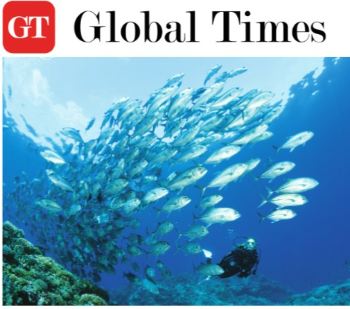|

A diver swims with a school of fish in the Solomon Islands. Photo: VCG - Courtesy from Global Times
Global fishing groups sound alarm as Japan goes ahead with dumping nuclear-tainted sewage
 JAPAN
JAPAN
Thursday, March 23, 2023, 07:00 (GMT + 9)
The following is an excerpt from an article published by the Global Times:
Days after the 12th anniversary of the Fukushima nuclear disaster, Japan began making preparations for the dumping of nuclear-contaminated wastewater from the Fukushima Daiichi nuclear power plant.
Despite strong internal and international opposition, Japan still intends to dump more than 1 million tons of irradiated water into the Pacific Ocean in the spring or summer of this year, the Japanese government confirmed in January.
This article features takes from fishery industry groups and individuals interviewed regarding Japan's decision to dump Fukushima's nuclear wastewater. It also looks into the potentially negative impacts this action could have on the fishing industry in the region and beyond from an economic and market perspective. This is the third of three installments by the Global Times.
.jpeg)
Aerial photo shows the damaged reactors at Fukushima Daiichi nuclear power plant on January 19, 2023, in Fukushima, Japan. Photo: VCG - Courtesy Global Times
Huang, a 58-year-old local fisherman in East China's Qingdao, Shandong Province, has been out in the sea fishing for most of his life. Most of his catch is from the East China Sea before it is served on the dinner tables of local and international consumers. Huang, who initially expected to continue his fishing career for at least another decade, may have to change such plans due to the current situation, forcing industry players like Huang to abandon their lifelong careers.
Over 1.3 million tons of nuclear-contaminated wastewater was generated by the Fukushima nuclear accident, with an additional 100 tons produced every day. The contaminated water is presently being stored in over 1,000 temporary tanks, and plans are underway to discharge it into the ocean over a 30-year timeframe.
According to research conducted by a German marine research institution, the radioactive materials from the contaminated water will spread to the majority of the Pacific Ocean within 57 days of being discharged, and will continue to travel to waters across the world over the next decade, painting a grim picture of the move's cross-border impact on the marine environment and public health.
.jpeg)
An aerial picture shows Fukushima No. 1 Nuclear Power Plant in Fukushima, Japan in February 2023. The decommissioning plant will soon mark the 12th anniversary of the unprecedented meltdown after the earthquake and tsunami in 2011. Japan's plan to discharge nuclear contaminated water into the sea worries the regional countries and international community. Photo: VCG - Courtesy Global Times
The impact has sounded the alarm on potential economic losses to local fishing communities due to a decline in consumer confidence and demand for seafood from the affected areas, several industry insiders told the Global Times.
While it is unclear exactly how much harm will result from the release of contaminated water, dumping of such magnitude is enough to spark concern and anger due to the irreversible damage to the ocean that such a move might cause, with marine life being among the first and most heavily affected by such damage, industry insiders and experts said, urging the Japanese government to reconsider its very irresponsible dumping plan.
Industry alarm
Huang has spent most of his time fishing in the Yellow Sea and parts of the East China Sea, and when the news about Japan's nuclear wastewater dumping broke, it hit too close for him and others in the fishing business.
"We are deeply concerned about the nuclear wastewater dump, not only because of its possible harm to our health, but also how it might threaten regional maritime resources, on which we are heavily dependent for our livelihood," Huang told the Global Times.

Environmental activists march during a rally to denounce Japan's planned dumping of wastewater containing radioactive materials into the sea on March 9, 2023, in Seoul, South Korea. Photo: VCG - Courtesy Global Times
Huang's concern is shared by other industry insiders including Sun Yanfa, a shellfish and seaweed farmer, who is also the deputy director at the Changhai Chamber of Commerce in Dalian, Northeast China's Liaoning Province.
Sun has been in the fishery industry for more than three decades, with his products increasingly gaining popularity not only in the Chinese market but also overseas, with the US and Japan being two major export markets.
But with growing consumer concerns linked to the intended dumping, Sun said that many ordinary people will resist consuming seafood not only from Japan but possibly from other regions as the impact spreads even wider.
Given the foreseeable damages to the local fishing industry, Sun insisted that "should there be any impact from the nuclear wastewater dump by the Japanese government, we should ask for compensation for the resultant losses."

Illustration:Liu Rui/GT
Chi Feiyue, deputy secretary-general of the China Fisheries Association told the Global Times that geographically speaking, adjacent waters such as the Yellow Sea region and the entire East China Sea, which is abundant in various marine products and is a primary production area for hairtail and ribbonfish, would bear the brunt.
For example, the Yellow Sea region, including the Liaodong Peninsula and the Shandong Peninsula, is the main breeding ground for shellfish, oysters, sea cucumbers, algae, and seaweed. Among them, scallop farming accounts for 90 percent of China's total output while wakame, a kind of seaweed, makes up 80 percent.
"We resolutely oppose Japan's discharge of nuclear wastewater, since if it had an impact, it would be devastating," Chi noted.
In addition to ocean currents, fish has a process of backflow, which itself also increases the risk of radiation contamination, Chi said. (continues...)
Source: Global Times / Read the full article by clicking the link here
editorial@seafood.media
www.seafood.media
|



